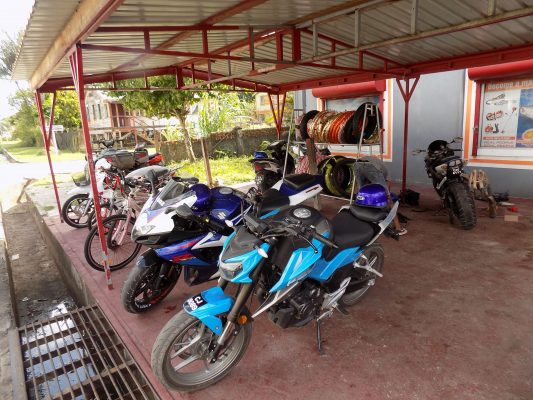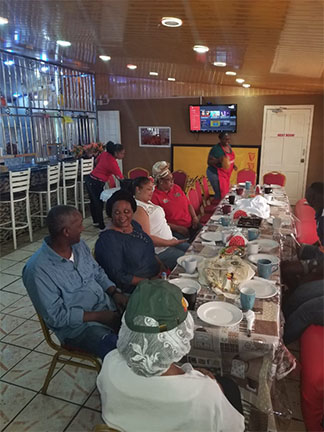What over the years, has been loosely described as the post-bauxite economic circumstances of the township of Linden are still very much evident today. This phenomenon is manifested chiefly in patent evidence of high unemployment and a threadbare business community that persists against formidable odds, to keep its head above water.
What also remains noticeable about Linden, is its refusal to wilt in the face of its protracted crisis, a semblance of normalcy manifested mainly in the community’s historical propensity for producing fertile minds. An appreciable number of Lindeners continue to pay tribute to the various types of contributions which the community continues to receive from “our people in the diaspora” and against the backdrop of a crisis that is still very much in evidence, the fragile business community continues to find creative ways of weathering the storm.
Thirty-three year old Hilton Lyle is one of those Lindeners who simply refuses to give up on his community. He simultaneously operates three separate enterprises – Foreign Links Auto Parts and Accessories, Foreign Links Motor Cycle and Spare Parts and Tropical Reflection Restaurant and Bar – all high-risk ventures in a community where spending power has long been a victim of high unemployment.

These past ten years, he has worked to build them from ‘ground up’, navigating the awkward twists and turns of a Linden economy that is predictable only in its permanent vulnerability.
His earlier years in paid employment helped to prepare him for the world of business. A short stint at a commercial bank as a Loans Officer had been followed by employment in a similar capacity with the Linden Economic Advancement Programme (LEAP). During his time at LEAP he took advantage of several courses offered by the institution in areas that included Business Management and Financial Management, among others. It was this kind of grounding that provided him with the confidence to ‘take the plunge’ into entrepreneurship.
In 2010 Hilton began selling motor vehicle spare parts and accessories including lubricants, suspensions, brake fluids, brake pads and air fresheners. The commencement of his career as a businessman coincided with a profusion of vehicle imports, chiefly minibuses, into Guyana. Businesses of that nature impacted immediately in Linden, reducing the higher costs associated with acquiring spare parts in Georgetown. That apart, his location at the rear of Linden Municipal Bus Park at Republic Avenue and Mora Street meant that he was easily accessible to buses plying the routes between Linden and Georgetown and Linden and Kwakwani.

Strategically, he continually monitored prices in Georgetown in order to ensure his own competitiveness. Two years of reliance on acquiring goods from various major importers taught him that there would be considerable advantage in sourcing goods from abroad, a move that afforded him a further price advantage. It was this, he says, that ultimately boosted his profits and afforded him the opportunity of expansion. His first expansion initiative was to seek to make his 8ft by 12ft stall larger. It was then that he began hitting hurdles, not least, being denied local authority permission to expand the stall. Even his application to expand upwards which would have obviated the need to utilise a greater area of land was denied. Eventually, due largely, he believes, to the manifest evidence that his enterprise was making a significant contribution to the Linden economy by keeping the mini buses, particularly, on the road, his application to erect a 38ft by 22ft structure secured the Council’s approval.
Increased accommodation allowed for thoughts of further expansion and the emergence of the motor cycle ‘mania’ in Linden opened up the opportunity for investment in both motor cycles and spares. Foreign Links Motor Cycles and Spare Parts was established at Mora Street and Independence Avenue. Public servants and nurses, he says, keen to secure relatively cheap and reliable transportation, have been his best customers. Conscious, he says, of the liquidity challenge which many of his would-be customers face, he offers a three-month lay-away plan that allows for the setting aside of cash over a three-month period.
Hilton’s ambitious enterprise benefits from the support of his father, Hilton Snr, a mechanic by training who serves as a consultant to his son and is the manager of the day-to-day operations of the auto spares and motor cycle spares services. His father’s contribution, Hilton says, includes invaluable advice on purchasing strategy including brands that are likely to do best on the market.
But Hilton’s excursion into entrepreneurship does not end there. In December 2017, he made a somewhat unusual diversification by launching Tropical Reflection Restaurant at the so-called ‘five corners’ junction.
A tough but lively township like Linden can do with more places like Tropical Reflection. The idea, he said, was triggered by the profusion of ‘fast food’ boxes littering the streets of Linden.
The junction is a strategic one, providing access for vehicles heading for Kwakwani, Ituni, Lethem, Mahdia, Bartica and various other farming, logging and mining areas. Food and plenty of it, is required for those long and far from comfortable journeys. The restaurant offers a pleasing range of dishes, mostly Guyanese creole, with a few Jamaican dishes thrown in for good measure. It provides employment for eighteen persons and offers a twenty-four-hour service. At a minimum it serves 120 meals every day and seats around 70 persons. Air conditioning provides welcome relief for what, all too frequently, is the fearsome heat of Linden. At weekends, there are also grill and barbecue offerings. Two Sundays ago, forty guests from Georgetown were scheduled to be there. He anticipates that the Linden Town Week in April could provide a windfall.
In pursuit of high service standards Hilton has turned to his parents. While his father is superintending the spare parts business, his mother June, manages The Reflection. Hilton’s now deceased sister was also part of the management of the business venture. All told, Hilton provides employment for twenty-four persons, not an insignificant number in the context of Linden’s high unemployment.
Hilton’s expansionist ambitions persist. Up until now he has secured a few modest loans from Republic Bank though further, more substantial loans depend largely on his ability to secure additional titled land in Linden.
Part of his concern is that far too little money circulates in Linden. He believes that the buses and trucks laden with goods, mostly food, and travelling from Georgetown to various interior regions, ought to be doing more business with farmers and other service suppliers in Linden. On the other hand he concedes that Linden’s farmers tend to look to Georgetown for higher prices for their produce. He’d love to support the local Linden farming community more, he says, but price considerations compel him to pursue the Georgetown option.
Allied to Hilton’s entrepreneurial disposition is a preoccupation with doing everything that he can to support his community. Expansion has become not just a matter of building a stronger business but also strengthening his capacity to provide employment. Like so many other Lindeners that you meet, you get the impression that from Hilton’s perspective, private entrepreneurial pursuits can have a transformational impact on the entire community and while he does not openly admit it you get the feeling that he seeks to lead by example.





